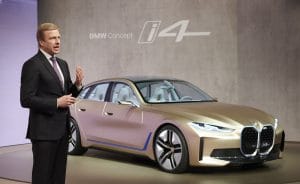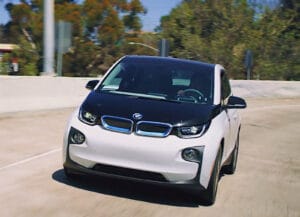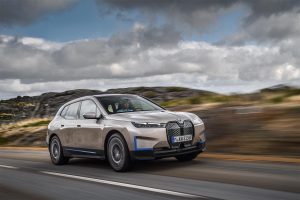
With an assortment of new models coming, starting with the recently revealed i4 and iX, BMW aims to fully double sales of all-electric models in 2021, the automaker said today.
When plug-in and conventional hybrids are factored in, meanwhile, BMW said that it would target a 50% jump in sales of electrified vehicles compared to 2020.
The announcement comes barely two weeks after BMW CEO Oliver Zipse said his company aims to have 20% of its total global sales volume come from various hybrid and all-electric models by 2023, a 250% increase from last year’s total. And Zipse said the automaker will significantly increase production of models like the iX and i4 to beyond original plans in order to reach that goal.
(BMW ‘significantly increasing” electric vehicle production.)
Like key competitors – indeed, like most automakers, in general – BMW has rapidly shifted resources from vehicles using conventional gas- and diesel-powertrain technology to those powered by electric batteries and motors. In November, the automaker announced a significant change in its electrification strategy, however.

Until then it had been focused on developing vehicle “architectures,” or platforms, that could use essentially any form of powertrain, from pure diesel or gas to hybrid and plug-in hybrid, as well as all electric. Now, however, it intends to develop separate platforms for vehicles using any form of internal-combustion engine and those running entirely on batteries.
And, with sales beginning to take off, especially in key markets like Europe and China, the automaker has upped its forecast for battery-electric vehicles, or BEVs, substantially. That comes at a time when it is preparing to rapidly increase the number of all-electric models it offers.
There are now 13 electrified models in the Bavarian marque’s line-up. Until recently, however, there was only one BEV option for BMW buyers, the little i3 city car. And range was so limited that many customers added the optional range-extending 3-cylinder gas engine.
(BMW’s EV flagship, 300-mile iX makes its debut.)
That’s about to change fast, BMW promising to have 25 electrified models in production by 2023, half of them fully electric, including the new i4 and iX models and still more coming.
At its November debut, BMW described the iX as is “comparable with the BMW X5 in length and width and is almost the same height as the BMW X6.” It will produce as much as 500 horsepower and deliver a range of as much as 300 miles, depending upon options such as battery pack size.

Automakers like BMW are hoping that increased range and performance will help them overcome traditional barriers to adoption. Like it or not, they’re being forced into the EV market in order to meet increasing stringent global emissions and fuel efficiency regulations. China, for example, recently announced that at least 20% of the new vehicles sold there by 2025 will have to be BEVs or longer-range PHEVs.
Europe has set some of the most stringent emissions targets and automakers could face massive fines for falling short. But, by delivering vehicles that buyers want, the goal is to cut subsidies and start delivering the sort of profit margins seen on conventional vehicles.
BMW said earlier this week that its global EV sales surged 31.8% in 2020, total sales of electrified vehicles reaching a record 193,000 despite the impact of the coronavirus pandemic. They accounted for 15% of total BMW sales in Europe – nearly twice the 8% global share.
(BMW does a complete u-turn on its EV program.)
To support its targeted growth, “We are significantly increasing the number of electric vehicles. Between 2021 and 2023, we will build a quarter of a million more electric cars than originally planned,” BMW CEO Zipse said in an interview with the German newspaper Augsburger Allgemeine published late last month.








“BMW Wants to Double EV Sales This Year.” Easy enough, they only have to sell two.
Uh, no. Globally, they were up sharply. Numbers are in the story.